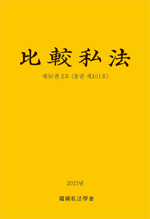특허무효와 특허라이센스・양도계약
Patent Invalidity and Patent License or Assignment Contract
- 한국사법학회(구 한국비교사법학회)
- 비교사법
- 제30권 제2호
-
2023.05193 - 222 (30 pages)
-
DOI : 10.22922/jcpl.2023.30.2.193
- 36

특허가 무효가 된 경우 특허라이센스계약의 효력에 관하여는 여러 논의가 있었고 이미 판례도 나와 있다. 그러나 판례의 비소급적 불능구성은 설득력이 없고 대체로 소급적 청산을 요구하는 학설의 제안 또한 그 실천적 귀결에 의문이 제기되고 있다. 종래의 논의가 특허라이센스가 아닌 특허양도의 경우에 연장될 수 있을지도 의심스럽다. 이 문제에 관하여 좀 더 풍부한 논의가 이루어진 독일, 프랑스, 미국의 예를 살펴보면 미국의 해결이 라이센스와 양도를 고르게 처리하는 데 한계가 있다는 점 외에 독일, 프랑스 모두 라이선시/양수인이 실제로 사실상 이익을 얻었는지 여부를 묻고 있다는 점이 드러난다. 이러한 점을 고려하려면 효과 수준에서, 즉 반환범위에서 사실상 이익을 반영하여야 한다. 그러므로 양도인/라이선서에게 권리하자에 대한 담보책임을 인정하되, 그 반환범위와 관련하여 양수인/라이선시가 얻은 사실상의 이익을 적절히 배려하는 것이 더 나은 해결책이다.
There has been abundant literature about the affect of patent invalidity upon the patent license contract. Meanwhile, the Supreme Court also took its position that patent invalidity should make the patent license contract non-retroactively impossible to perform. The non-retroactive impossibility construction of the case law is, however, not convincing, while the opposing proposals in the literature that call for retroactive liquidation are questionable in terms of their practical consequences. More importantly, the non-retroactive impossibility approach cannot be extended to the patent assignment contract. A close examination of the relevant cases in Germany, France, and the United States reveals that the approach adopted by the United States’ courts has difficulty in treating patent licenses and patent assignments consistently, and that the approaches adopted in German and French courts ask whether the licensor/assignee has actually benefited. In order to take this de-facto benefit factor into account, the benefit must be reflected when the judges determine the scope or amount of the restitution. Therefore, a better solution would be to recognize the assignor/licensor's warranty liability for the defect of the title, but to give due consideration to the de-facto benefit of the assignee/licensee in the scope or amount of restitution.
Ⅰ. 서론
Ⅱ. 비교법적 고찰
Ⅲ. 우리 법의 검토
Ⅳ. 결론
(0)
(0)